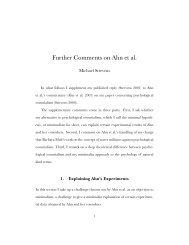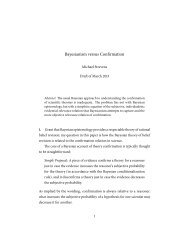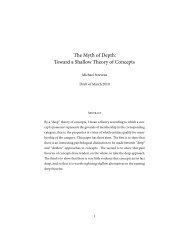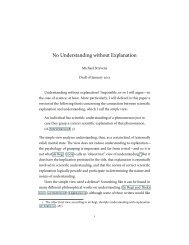The Essentialist Aspect of Naive Theories - Michael Strevens
The Essentialist Aspect of Naive Theories - Michael Strevens
The Essentialist Aspect of Naive Theories - Michael Strevens
You also want an ePaper? Increase the reach of your titles
YUMPU automatically turns print PDFs into web optimized ePapers that Google loves.
normally called water. That is, although humans classify, say, tea as a kind <strong>of</strong><br />
water, this fact is obscured by the linguistic fact that humans invariably refer<br />
to tea as “tea”. 23 This objection takes advantage <strong>of</strong> a weakness in Malt’s<br />
experiment: Malt did not ask her subjects what they counted as water, but<br />
simply assumed that anything with “water” in its name is counted as water,<br />
and anything else is counted as non-water (Malt, 1994, 45). 24<br />
Abbott’s claim that tea is categorized as water is open to an obvious<br />
objection: when asked, people say that tea is not water. (This is easily confirmed<br />
informally.) Could it be that, when they say this, they mean only that<br />
tea is not called water? This does not fit the facts: people say that snow is<br />
water, despite the fact that snow is never called water (outside <strong>of</strong> a chemistry<br />
class). Or to take an example from the biological realm, people asked<br />
whether a Bombay duck is a duck, and who know that it is a kind <strong>of</strong> fish,<br />
will say no. <strong>The</strong>re is, I conclude, very good reason to think that these types<br />
<strong>of</strong> questions elicit information about categories, not names.<br />
At this point the essentialist might suggest that, when people report that<br />
they do not count tea as a kind <strong>of</strong> water, they are mistaken. I have already<br />
said something above about the suggestion that people make this sort <strong>of</strong><br />
error in kind/essence inferences. What is new here is a particular story<br />
about what causes the confusion: it is brought on by exposure to too much<br />
language. Because tea is always referred to as “tea”, people tend to forget<br />
that they also count it as a kind <strong>of</strong> water.<br />
<strong>The</strong>re are at least two reasons to think that this line <strong>of</strong> thought is flawed.<br />
First, a simple confusion like this ought to be easy to overcome once it is<br />
pointed out that a thing’s name is not always the last word about its nature.<br />
But even sophisticated adults aware <strong>of</strong> the issues resist the suggestion that<br />
tea, blood, and grapefruit juice are kinds <strong>of</strong> water.<br />
Second, there are things that everyone counts as kinds <strong>of</strong> water, but<br />
that are usually referred to using other terms: rain, ice, and snow are good<br />
examples. If it were names that were causing the problem, it should be just<br />
23. Abbott is writing primarily about language, and the difference she emphasizes is<br />
not between categorization and naming but between the semantics and pragmatics <strong>of</strong> the<br />
meanings <strong>of</strong> names. However she assumes that semantics and categorization go together;<br />
see bottom <strong>of</strong> p. 312.<br />
24. For example, Malt counts tears as non-water. My own informal investigations show<br />
that many people are at least somewhat inclined to classify tears as water, suggesting that<br />
Malt’s criterion is unreliable. <strong>The</strong> argument I make in the main text does not depend on<br />
any <strong>of</strong> these borderline cases.<br />
30






